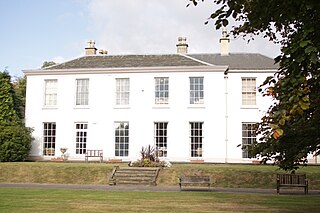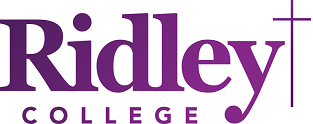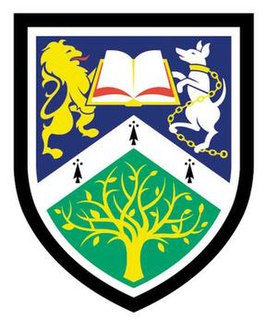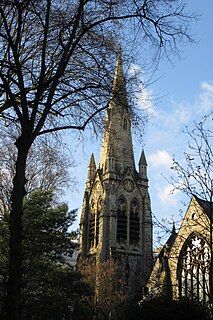The Acadia Divinity College (ADC) is the official seminary of the Canadian Baptists of Atlantic Canada (CBAC), functioning within its evangelical tradition, and governed by a Board of Trustees with members appointed by the Convention and the Board of Governors of Acadia University. The College is also the Faculty of Theology of Acadia University. The University awards all of the Acadia Divinity College degrees, upon recommendation from the ADC Senate and the Senate of Acadia University. The graduate degrees are fully accredited by the Association of Theological Schools in the United States and Canada.

The University of Wolverhampton is a public university located on four campuses across the West Midlands, Shropshire and Staffordshire in England. The roots of the university lie in the Wolverhampton Tradesmen's and Mechanics' Institute founded in 1827 and the 19th-century growth of the Wolverhampton Free Library (1870), which developed technical, scientific, commercial and general classes. This merged in 1969 with the Municipal School of Art, originally founded in 1851, to form the Wolverhampton Polytechnic.
Tyndale University is a private multi-denominational evangelical Christian university in Toronto, Ontario, which overs undergraduate and graduate programs. Tyndale students come from over 40 different Christian denominations.
King's Evangelical Divinity School is a nondenominational Christian Bible college based in Broadstairs, Kent in England. The college provides studies by open and distance learning in partnership with the University of Chester, and specialises in hermeneutics.

St John's College, Nottingham, founded as the London College of Divinity, was an Anglican and interdenominational theological college situated in Bramcote, Nottingham, England. The college stood in the open evangelical tradition and stated that its mission is "to inspire creative Christian learning marked by evangelical conviction, theological excellence and Spirit-filled life, that all who train with us might be equipped for mission in a world of change".

Ripon College Cuddesdon is a Church of England theological college in Cuddesdon, a village 5.5 miles (8.9 km) outside Oxford, England. The College trains men and women for ministry in the Church of England: stipendiary, non-stipendiary, local ordained and lay ministry. Through a wide range of flexible full-time and part-time programmes.

Ridley College, formerly known as Ridley Melbourne, is a Christian theological college in the parklands of central Melbourne. Established in 1910, it has an evangelical foundation and outlook and is affiliated with the Australian College of Theology and the Anglican Church of Australia. The college offers on-campus and distance learning and provides training for various Christian ministries in a range of contexts.
Burton and South Derbyshire College is a college located in Burton upon Trent in England. Early in 2011 the college was renamed from "Burton College".

Ashfield School is a secondary school with academy status located in Kirkby-in-Ashfield, Nottinghamshire, England, which educates children ages 11–19.
Selly Oak Colleges was a federation of educational facilities, primarily concerned with theology, social work and teacher training, in Selly Oak, Birmingham, England. The Federation was for many years associated with the University of Birmingham. They included the College of the Ascension, Crowther Hall, Kingmead College, St Andrew's Hall.

The Theological College of Lanka (TCL) is a college that was inaugurated in 1963 by the Anglican Church, the Methodist Church and the Baptist Church in Sri Lanka. Later the Presbyterian Church joined the federation, to educate the new clergy (ministers) and laity in the environment and context of Sri Lanka and their own languages, Sinhala and Tamil. Rev. Basil Jackson, a British Methodist Missionary, became the founding Principal of the college in 1963.. It is believed that language is the vehicle of culture and when Christians begin to think, speak, preach, pray and write in their own languages, they soon become familiar with their cultural values and begin to appreciate them in the practice of their Christian faith. This new step was foreseen by all the churches as an attempt to produce indigenous theology by people who are being educated in Sri Lanka.

Redcliffe College is a mission training centre and theological college based in Gloucester, England, specialising in training men, women and families working in Christian mission and ministry anywhere in the world. It is international and interdenominational, and is a member of the Evangelical Alliance and Global Connections.
South London Christian College an international college with a vision for training leaders from the Global South was founded in 1991 in Clapham, London, England. It then relocated in 2006 to Grove Park, London, until its closure in October 2012. Training resumed in 2013 under the new auspices of Global Christian Institute.
Eric J. Lott is a religious scholar who taught in Andhra Pradesh and Karnataka. Of the Indian languages, he knew Sanskrit, Telugu and Kannada.

The University of Wales Trinity Saint David is a multi-campus university with three main campuses in South West Wales, in Carmarthen, Lampeter and Swansea, a fourth campus in London, England, and learning centres in Cardiff, Wales, and Birmingham, England.

St Mellitus College is an English theological college established in 2007 by the Diocese of London and the Diocese of Chelmsford of the Church of England. It has campuses in Earl's Court, Chelmsford, Liverpool and Plymouth, with growing links with other churches, colleges and dioceses throughout the UK and beyond. The president is Graham Tomlin, Bishop of Kensington, and the dean is Andy Emerton. St Mellitus College is a wholly non-residential college and has pioneered context-based training within the Church of England, integrating academic theological study with ministry placements throughout the course of study.

Canterbury Christ Church University (CCCU) is a public university located in Canterbury, Kent, England. Founded as a Church of England college for teacher training in 1962, it was granted university status in 2005.
St Augustine's College of Theology is a non-residential Anglican theological college in the Southeast of England. Founded in 1994 as the South East Institute for Theological Education (SEITE), the college trains men and women for ordained and lay ministry in the Church of England and other denominations, under the Common Awards programme.
The International Bible Training Institute (IBTI) is an evangelical, Pentecostal Bible college based in Burgess Hill, West Sussex, United Kingdom. It is a residential college and has been involved with Christian mission work and relief work abroad since it was founded by Fred H. Squire in 1947. The college offers three types of Biblical studies. The current directors are John and Eliana Whyte.
Trinity College Queensland is a theological institution of the Queensland Synod of the Uniting Church in Australia.








